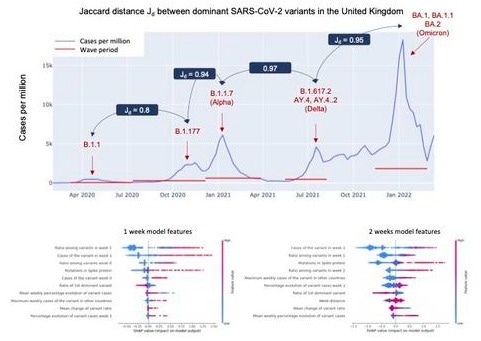Which SARS-CoV-2 variations are most likely to spread and produce subsequent disease waves could have been predicted by an AI algorithm. Variant-specific spread is not predicted by the models currently in use to forecast the dynamics of viral transmission.
 Jaccard distance Jd between dominant SARS-CoV-2 variants in the United Kingdom. Image Credit: Levi et al
Jaccard distance Jd between dominant SARS-CoV-2 variants in the United Kingdom. Image Credit: Levi et al
Based on analysis of 9 million SARS-CoV-2 genetic sequences gathered from 30 countries by the Global Initiative on Sharing Avian Influenza Data (GISAID), as well as information on infection and vaccination rates and other factors, Retsef Levi and colleagues investigated the potential drivers of the viral spread.
The patterns of this analysis were utilized to create a risk assessment model with machine learning capabilities. After a mere one-week observation period following discovery, the algorithm can identify 72.8% of the variations in each nation that would result in at least 1,000 instances per million people within the next three months. Two weeks of observation resulted in an increase in this predictive performance to 80.1%.
The early trajectory of infections produced by a variant, the variant’s spike mutations, and the degree to which the mutations of a new variant differ from those of the most dominant variant over the observation period are some of the best indicators of whether or not a variant will become infectious. The authors suggest that the modeling method might also be used to forecast the future development of other infectious diseases.
Journal Reference:
Levi, R., et. al. (2023) Predicting the spread of SARS-CoV-2 variants: An artificial intelligence enabled early detection. PNAS Nexus. doi:10.1093/pnasnexus/pgad424